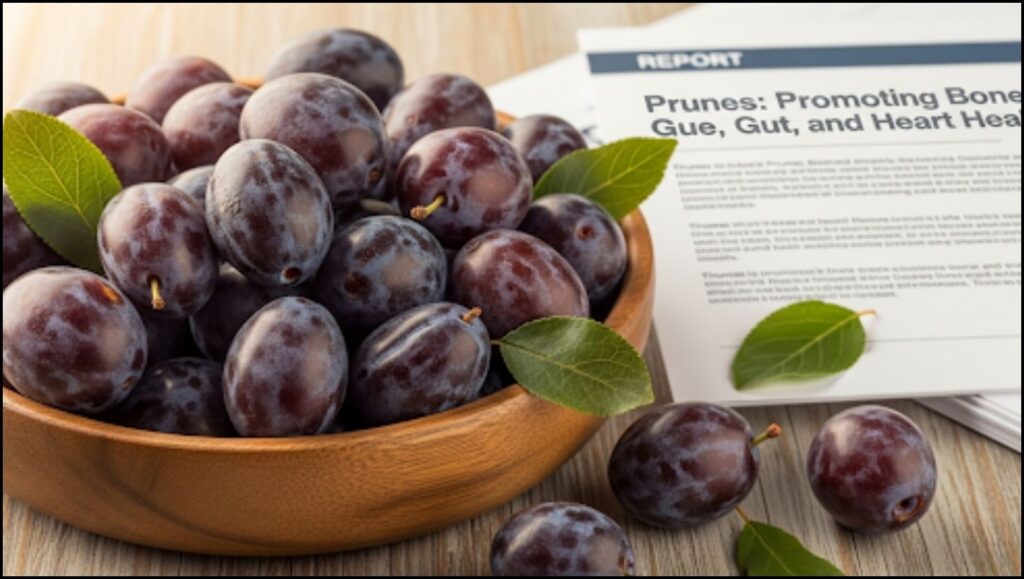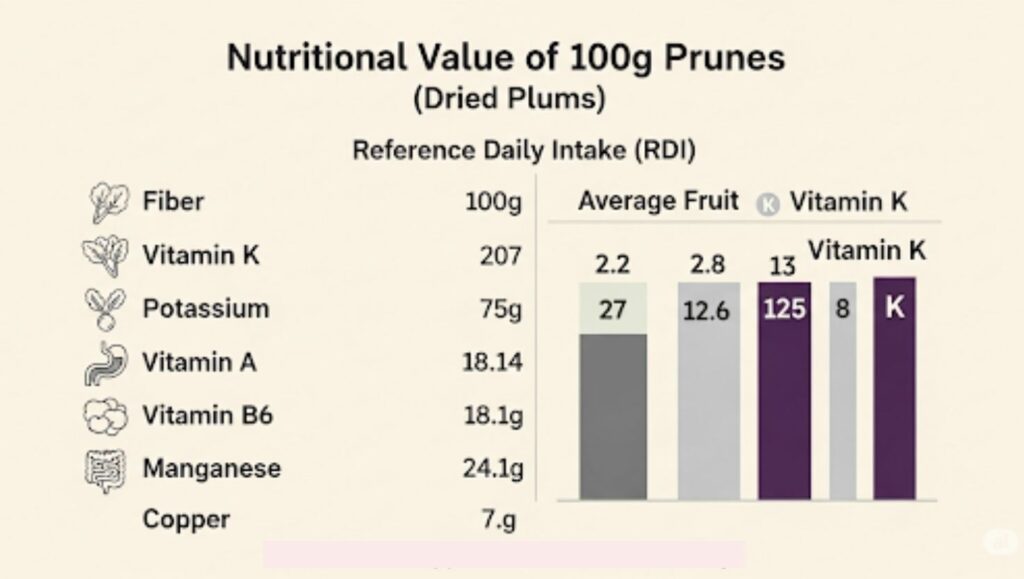Long relegated to the back of the pantry as a simple digestive aid, prunes are now the subject of rigorous scientific study. New research reveals the extensive health benefits of prunes extend far beyond regularity, highlighting their significant role in protecting against bone loss, supporting cardiovascular health, and managing blood sugar, prompting nutrition experts to advocate for a second look at this humble fruit.

Key Health Insights: The Prune Profile
| Key Benefit | Detail / Statistic |
| Bone Protection | Eating 50-100 grams (about 5-10 prunes) daily may help prevent bone mineral density loss in postmenopausal women. |
| Gut Health | A 100g serving provides ~7g of fiber and contains sorbitol, which aids digestion and promotes beneficial gut bacteria. |
| Heart Health | Rich in potassium and polyphenols, which help manage blood pressure and reduce inflammation. |
| Nutrient Dense | Excellent source of Vitamin K, essential for bone metabolism and blood clotting. |
A Powerful Ally for Bone Health
Perhaps the most compelling new evidence surrounding prunes relates to bone health, particularly for postmenopausal women who face an increased risk of osteoporosis. A series of studies from Pennsylvania State University has provided strong evidence that daily prune consumption can help counteract bone density loss.
In one key clinical trial published in The American Journal of Clinical Nutrition, researchers found that postmenopausal women who ate 100 grams of prunes (about 10 prunes) daily for one year had significantly higher bone mineral density in their forearm and lower spine compared to a control group that ate dried apples. More recent follow-up research from Penn State suggests that even a smaller serving of 50 grams, or about five to six prunes, may be effective.
“Our latest research has shown that daily consumption of 5-6 prunes can reduce inflammatory mediators that contribute to bone loss in postmenopausal women,” explained Dr. Mary Jane De Souza, a distinguished professor of kinesiology and physiology at Penn State and a lead researcher on the studies. She added that prunes appear to work by suppressing the breakdown of bone while not affecting the rate of bone formation.
Scientists attribute these benefits to a unique synergy of nutrients, including Vitamin K, potassium, boron, and various polyphenols, which work together to support bone metabolism and reduce oxidative stress.
The Well-Established Link to Improved Gut Health
The best-known attribute of prunes—their ability to promote digestive regularity—is also strongly supported by science. Often marketed as dried plums to appeal to a wider audience, their effectiveness is due to a trio of key components. First, they are rich in insoluble fiber, which adds bulk to stool and helps it pass more quickly through the digestive system. Second, they contain soluble fiber, which acts as a prebiotic, feeding the beneficial bacteria in the gut. A healthy gut microbiome is increasingly linked to overall health, from immune function to mood.
Third, prunes contain sorbitol, a sugar alcohol that has a natural osmotic laxative effect, drawing water into the large intestine and stimulating bowel movements. A 2011 review published in Alimentary Pharmacology & Therapeutics concluded that prunes were superior to psyllium, a common ingredient in fiber supplements, for improving stool frequency and consistency.

Emerging Evidence for Cardiovascular and Metabolic Support
Beyond bones and the gut, research points to other significant health benefits of prunes. Their high potassium content is crucial for cardiovascular health. The American Heart Association (AHA) states that adequate potassium intake helps manage high blood pressure by lessening the effects of sodium. A 100-gram serving of prunes contains a substantial amount of the daily recommended potassium intake.
Furthermore, the soluble fiber in prunes can help lower LDL (low-density lipoprotein), or “bad,” cholesterol levels. This fiber binds with cholesterol-containing bile acids in the intestines and carries them out of the body.
Many people are concerned about the sugar content of dried fruit, but prunes have a surprisingly low glycemic index (GI) of around 29. This means they do not cause a rapid spike in blood sugar levels, making them a suitable snack for individuals managing their blood sugar. “Despite their sweet taste, prunes do not significantly raise blood glucose or insulin levels,” a study in the Journal of the American Dietetic Association noted, likely due to their high fiber, fructose, and sorbitol content.
Incorporating Prunes Into a Balanced Diet
Experts advise moderation and a balanced approach. For those unaccustomed to a high-fiber diet, it is recommended to start with a smaller portion, such as two or three prunes per day, and gradually increase intake to allow the digestive system to adapt.
“Prunes are incredibly versatile,” says Dr. Connie Weaver, a distinguished professor of nutrition science at Purdue University. “They can be added to morning oatmeal or yogurt, blended into smoothies, or used in savory dishes like stews and sauces to add natural sweetness and depth.”
While prune juice is an option, health professionals generally recommend consuming the whole fruit. The juicing process removes most of the beneficial fiber, which is critical for many of the fruit’s digestive and metabolic benefits. As research continues to uncover the complex ways in which whole foods impact human health, the prune stands out as a prime example of a functional food. Its unique combination of fiber, vitamins, minerals, and phenolic compounds offers a wide range of protective benefits that are giving this traditional remedy a well-deserved modern reputation as a superfood.
Why Princess Diana’s Breakfast Embodied a Modern Approach to Health
